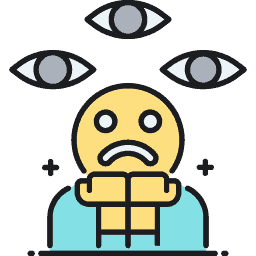
Dealing with mental illness in friends and relatives is complicated and emotional. All too often the conditions can seem to emerge without warning. While conditions like dementia and schizophrenia are discussed frequently in the mainstream, conditions like delusional disorder are less commonly discussed. This, in turn, makes it harder to research and ultimately prepare for.
An example would be the ongoing belief that one is being followed or surveilled, despite a lack of evidence and no real reason to have the suspicion. Living with a delusional disorder can considerably complicate a person’s ability to maintain a happy life and harmonious relationships with their peers.

What is the primary cause of delusional disorder?
While the exact cause of the delusional disorder is unknown, medical researchers narrow the most consistent causes to genetic and environmental or psychological factors. The latter is simply drug or alcohol abuse; the genetic factor is substantiated by a pattern of delusional disorder commonly occurring among family members. This not only suggests that genes are involved but is also supported by the fact that most mental disorders are passed on from parents to children “in the form of tendencies toward mental disorders.”
Try BetterHelp.com for delusional disorder.
15% off for Healthy Minded visitors.
A Quick Look at The Different Types of Delusional Disorder & Their Symptoms
For the purposes of study, treatment, and analysis, delusional disorder has been categorized into several subtypes. It’s worth noting that some individuals can exhibit two or more different subtypes simultaneously throughout their daily lives. Below is a brief list of the different kinds of delusions in no particular order.
Somatic Delusional Disorder involves a persistent preoccupation with the individual’s own bodily functions or physical attributes. People with this delusion are typically convinced they are suffering an undetectable physical malady such as parasitism or are the only ones noticing a deformity in their bodies for some reason. This usually results in their repeatedly setting appointments with medical professionals for general check-ups and a degree of frustration at being given a clean bill of health.
Grandiose Delusional Disorder involves a sense of intellect, power or social standing disproportionate to the individual’s actual accomplishments— typically, this unwarranted sense of identity results in socially unproductive behaviors such as condescension or racism. Common causes of this delusion involve an individual convinced they’ve made an important discovery or have a unique talent deeming them irreplaceable to society.
The late musician Michael Jackson suffered from grandiose delusional disorder. Jackson believed that he was a messiah and had supernatural powers, despite having no evidence to back up these claims. He also believed he could control the weather, communicate with animals and possess healing abilities. His delusions caused him to live an often reclusive lifestyle, seek out expensive medical treatments, and create numerous bizarre friendships.
Check out our top-rated therapy services. Healthy Minded visitors get a 15% discount.
Jealous Delusional Disorder involves believing that the individual’s spouse or significant other is unfaithful. This is usually based on spurious evidence and the individual’s own interpretation of imagined inferences in everyday interactions. This particular delusional disorder causes a high risk of aggressive behavior (and even violence) not only toward the individual’s partner but also toward those around them.
Erotomanic Delusional Disorder is the belief that a person is in love with the individual suffering the delusion. This can be triggered by a misinterpretation of everyday interaction. It can often lead to stalking, unwanted contact or other illegal behavior. A famous case of erotomanic delusional disorder is that of musician John Hinckley, Jr., who developed an obsession with the actress Jodie Foster. He believed that Foster was in love with him, even though they had never met and she had never expressed any interest in him. As a result of his delusion, Hinckley attempted to shoot United States President Ronald Reagan in an attempt to impress Foster and get her attention.
Persecutory Delusional Disorder means people hold an irrational belief that the individual is being plotted against, continually maligned in secret or generally mistreated by their peers. People suffering from this delusion often file lawsuits or complaints to the authorities for their imagined persecution.
One well-known case of persecutory delusional disorder is former U.S. President Richard Nixon, who suffered from the condition while he was in office. Nixon believed that a variety of people were conspiring against him, including fellow politicians and members of the media. He thought that they were trying to sabotage his policies, discredit him publicly and even assassinate him. He went to great lengths to protect himself by hiring bodyguards, installing recording devices in the White House, and even building a wall around his home.
Grandiose Delusional Disorder involves a sense of intellect, power, or social standing disproportionate to the individual’s actual accomplishments. Typically it results in socially unproductive behaviors such as condescension or racism. Common cases involve individuals convinced they’ve made an important discovery or have a unique talent deeming them irreplaceable to society.
Somatic Delusional Disorder is a persistent preoccupation with one’s own bodily functions or physical attributes. People with this delusion are typically convinced they are suffering an undetectable physical malady such as parasitism or are the only ones noticing a deformity in their bodies for some reason. This usually results in their repeatedly setting appointments with medical professionals for general check-ups and a degree of frustration at being given a clean bill of health.
Jealous Delusional Disorder is the belief that the individual’s spouse or significant other is unfaithful. This is usually based on spurious evidence and the individual’s own interpretation of imagined inferences in everyday interactions. It causes a high risk of aggressive behavior (and even violence) toward the individual’s partner, as well as those around them.
Delusional Disorder in The Mainstream

While delusional disorder hasn’t historically been front and center during discussions on mental health the way anxiety disorders and depression have, the politics of the past two years have had a significant part in raising public awareness. At a Yale conference in 2017, a group of psychiatric experts diagnosed President Trump with a number of delusional disorders based on his meeting their respective sets of criteria.
According to a number of psychiatrists, professors and medical professionals who spoke at the conference, these disorders are a serious impediment to the president’s ability to discharge the powers and duties of his office. They went on to cite his perceived “ongoing war” with the press and media in general, as well as his willingness to forego the advice of his top intelligence officials in matters of diplomacy – instead insisting that his personal business sense makes him uniquely qualified to ignore the input of qualified professionals in the field. In a 2015 Bill O’Reilly interview, the president said, “There’s nobody bigger or better at the military than I am.”
In light of his handling of the United States presidency, thousands of medical professionals across the country are convinced President Trump is suffering from a delusional disorder with paranoid and grandiose features. And while their findings drew some criticism for breaking the so-called Goldwater Rule, most of the professionals asserted that a “psychiatric interview is the least statistically reliable way of making a diagnosis.”
There have also been illegitimate diagnoses of delusional disorder made in the mainstream as recently as last year. During the Brett Kavanaugh imbroglio of October 2018, attorney and conservative pundit Joe DiGenova claimed the Supreme Court nominee’s accuser was “delusional” with nothing but tears to corroborate her story. This statement quickly fell apart, given Dr. Christine Blasey Ford – a professor of psychology at Palo Alto University and a research psychologist at Stanford University’s School of Medicine – did not meet any of the criteria for diagnosis or exhibit any of the symptoms during her testimony before Congress.
Treatments For Delusional Disorder
Because long-standing delusions and their accompanying behaviors are essentially the only symptoms of delusional disorder, it can be hard to identify early on. Subtypes of delusional disorder are often mistaken for less serious psychological disorders, especially in adolescents. For instance, the delusional somatic disorder can be mistaken for body or gender dysmorphia; persecutory delusional disorder can be mistaken for a mild phase of martyr complex and so on. Some parents assume that bouts of dysmorphia, victim mentality or delusions of grandeur are normal in the course of adolescent life.
As of this writing, delusional disorder is generally considered difficult to treat. Aside from cognitive behavioral therapy (CBT) and specialized psychotherapy, conventional antipsychotics such as chlorpromazine and fluphenazine have been commonly prescribed by psychiatrists since the 1950s. In many cases, sedatives and antidepressants are also prescribed to treat the mood- or anxiety-suppressant symptoms that occur as a result of specific delusional disorders.
More research and study are needed to understand the root causes of delusional disorder. With a greater wealth of knowledge, the psychiatric establishment may be able to identify the disorder much earlier on – as well as understand how exactly it is passed on between family members.
- Fear of Stupidity: Effects and Treatments for Stultophobia - February 16, 2024
- Body Scan Chronicles: Our Publisher Breaks Through Chronic Pain With Meditation - January 23, 2024
- VR Meditation App: A Beginner’s Guide to Virtual Reality Meditation - July 13, 2023


